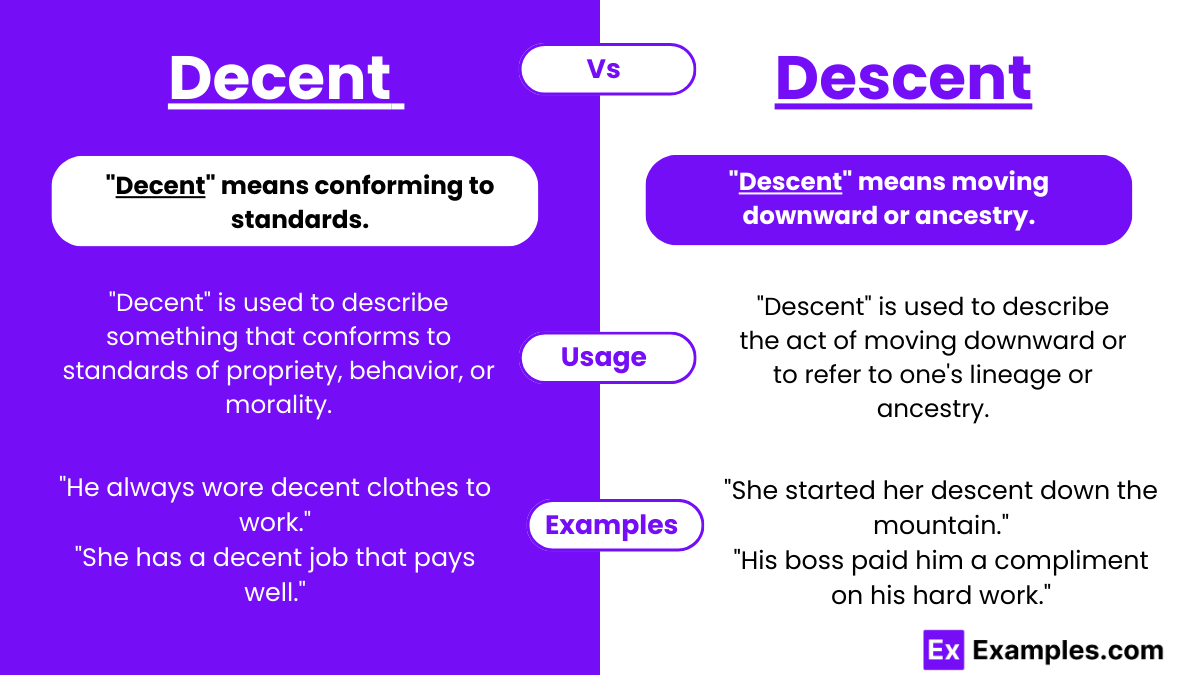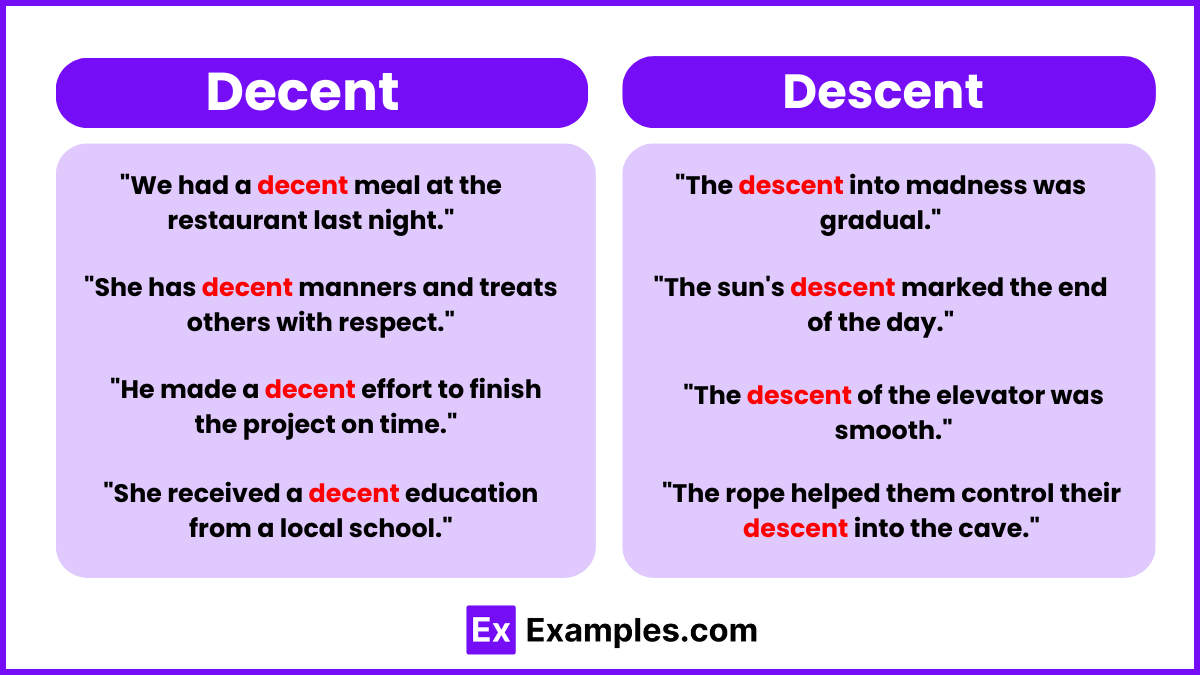Decent vs Descent – Meaning, Differences, Examples, Usage, Tricks, PDF
In the realm of English vocabulary, distinguishing between “decent” and “descent” is crucial for clear and precise communication, particularly for students looking to enhance their linguistic skills. The adjective “decent,” embodies the notion of being socially acceptable or conforming to the moral standards of society. It spans a spectrum from referring to basic acceptability and propriety in conduct or appearance, to signifying something that is commendably adequate but not outstanding. Whether it’s about being suitably attired for company or possessing commendable qualities, “decent” encapsulates a broad range of positive attributes that align with societal norms and values.
On the other hand, “descent,” navigates a different lexical territory as a noun, describing a movement downward, whether in a physical, social, or metaphorical sense. It can illustrate the act of moving to a lower position, such as descending a staircase, or refer to a decline in status or conduct. Moreover, “descent” holds significance in genealogy, denoting lineage or ancestral heritage, thus connecting individuals to their familial roots. As students venture into the nuances of these terms, understanding their distinct pronunciations and contextual applications becomes indispensable in mastering their usage and avoiding common pitfalls in English language communication.
Decent and Descent – Meanings
Decent: The adjective “decent” encompasses standards of social acceptability and morality, often implying a level of propriety or respectability. It describes conditions or behaviors that align with societal norms, suggesting adequacy and modesty without necessarily implying excellence. In evaluating actions, appearances, or quality, “decent” signifies that something meets a satisfactory standard, veering towards the positive without reaching the pinnacle of perfection. Additionally, it can denote a person’s integrity or virtue, highlighting their moral uprightness and respect for community values.
Descent: “Descent”, as a noun, primarily signifies a downward movement or trajectory, whether literal, as in descending a mountain, or figurative, such as a decline in social status. It captures the act of moving from a higher to a lower position, encompassing physical, social, and metaphorical declines. Beyond its association with decline, “descent” also plays a critical role in genealogy, referring to one’s lineage or ancestral heritage. This aspect connects individuals to their family history, tracing their cultural and biological origins through generations, thus embodying a journey back through the family tree.
Summary
“Decent,” an adjective, conveys the idea of something that meets societal norms or exhibits a level of quality that is satisfactory, reflecting propriety and moral integrity. It implies a condition or behavior that is respectable and fitting within the accepted standards. Conversely, “descent,” as a noun, refers to the act of moving downward, either in a literal sense like a physical decline, or symbolically representing a decrease in status or condition. Additionally, it encompasses the concept of lineage, denoting an individual’s heritage or familial background, thus connecting a person to their ancestral roots and cultural identity.
How to Pronounce Decent and Descent
- Decent: Pronunciation: /ˈdiː.sənt/. The word “decent” starts with a ‘d’ sound, followed by a long ‘ee’ sound as in “see.” The middle has a soft ‘s’ sound, and it ends with a ‘nt,’ where the ‘e’ is silent.
- Descent: Pronunciation: /dɪˈsent/. “Descent” begins with a ‘d’ sound, followed by a short ‘i’ sound as in “sit.” The second syllable is stressed, with an ‘s’ sound followed by ‘ent,’ where the ‘e’ is pronounced like the ‘e’ in “end.”
Difference Between Decent and Descent
Grasping the distinction between “decent” and “descent” is crucial for accurate language use, as they differ in meaning and context.
| Aspect | Decent | Descent |
|---|---|---|
| Part of Speech | Adjective | Noun |
| Meaning | Conforming to standards of propriety, good or acceptable quality. | The act of moving downward, or ancestry and lineage. |
| Pronunciation | /ˈdiː.sənt/ | /dɪˈsent/ |
| Usage | Describes something as respectable, adequate, or satisfactory. | Refers to a downward movement or one’s familial background. |
| Context | Often used in reference to standards, morality, or quality. | Used to describe physical movement, decline, or heritage. |
| Examples | “Decent behavior,” “a decent meal.” | “Mountain descent,” “of noble descent.” |
| Synonyms | Satisfactory, respectable, proper. | Decline, drop, lineage, ancestry. |
| Antonyms | Indecent, improper, inadequate. | Ascent, rise, non-ancestral. |
| Related Terms | Decency, indecent. | Descendant, ancestry. |
| Common Confusions | Sometimes confused with “descent” when misspelled or misheard. | Often misspelled as “decent” by those unaware of the difference. |
How to Remember the Difference between Decent and Descent
To distinguish between “decent” and “descent,” remember:
- Decent = Decency: Associate “decent” with “decency” or being proper. Think of “decent” as describing something that meets a good standard or is socially acceptable.
- Descent = Descend: Link “descent” with “descend,” as both relate to going down. Whether it’s moving to a lower place or tracing ancestry, “descent” involves a downward direction.
- “E” for Ethics: The first “e” in “decent” can remind you of “ethics,” signifying moral standards and good behavior.
- “S” for Steps Down: The “s” sound in “descent” can evoke the image of “steps” going down, helping you remember its association with downward movement or lineage.
- Visual Cue: Picture a “decent” person wearing a “decent” outfit (respectable) and a family tree illustrating “descent” (ancestry or going down).
Examples of Decent and Descent
Examples of Decent:
- She always makes sure to maintain a decent level of cleanliness in her apartment.
- The job offer he received had a decent salary package and benefits.
- For a budget hotel, the accommodations were quite decent.
- He’s known for being a decent person who always helps others.
- The restaurant served decent food at reasonable prices.
Examples of Descent:
- The hiker carefully planned his descent from the mountain before sunset.
- The documentary traced the family’s descent from European immigrants.
- During the descent of the aircraft, the passengers felt a slight turbulence.
- The movie depicted the villain’s gradual descent into madness.
- Her research into her genealogy revealed a descent from African royalty.
When to Use Decent and Descent
Choosing between “decent” and “descent” hinges on context, as these words differ significantly in meaning despite their similar spelling. “Decent” relates to standards of acceptability and quality, while “descent” involves downward movement or lineage. Understanding their distinct uses is key to effective communication.
Usage of “Decent”:
- To describe something that meets satisfactory standards or is of good quality.
- When referring to moral and ethical behavior or respectability.
- To indicate something is fairly good or adequate.
Usage of “Descent”:
- When talking about moving downward, such as in altitude or position.
- In discussions related to family lineage or ancestry.
- To describe a decline in status, condition, or mood.
How to Use Decent and Descent
Mastering the use of “decent” and “descent” is vital for clear communication, as each word serves a distinct purpose in language, reflecting either standards of adequacy or notions of decline and lineage.
How to Use “Decent”:
- Quality or Standard: Use “decent” to describe something that is of satisfactory quality or meets a certain standard. For example, “The hotel room was decent for the price we paid.”
- Morality: Apply “decent” when referring to behavior that is ethical, moral, or respectable. For instance, “He is known to be a decent and honest man.”
- Adequacy: Utilize “decent” to imply that something is adequate or acceptable, even if it’s not outstanding. Example: “She earned a decent score on her exam.”
How to Use “Descent”:
- Downward Movement: Use “descent” when describing a movement from a higher to a lower position. For example, “The climber carefully planned his descent from the mountain.”
- Ancestry: Apply “descent” to discuss someone’s ancestry or lineage, highlighting their family background or heritage. For instance, “She is of Scottish descent.”
- Decline: Use “descent” to denote a decline or deterioration in condition, status, or quality. Example: “The narrative explores the character’s descent into madness.”
Tricks for Decent and Descent
To remember the difference between “decent” and “descent,” consider these tricks:
- “Decent” contains “cent,” like in “century,” which is a long period during which good standards or decency might evolve. Think of “decent” as something that stands the test of time in terms of quality or morality.
- “Descent” has “sc” like “slope” or “scale,” which can remind you of going down a slope or scale, fitting the idea of moving downward or tracing lineage, as you “scale” back through a family tree.
- Associate “decent” with “decorum,” as both start with “dec” and relate to appropriateness and good standards.
- Link “descent” with “decline,” since they both start with “de” and involve a downward movement or a reduction in status.
- Visualize a “decent” piece of clothing that covers you adequately, implying it’s good or acceptable, versus visualizing a “descent” as an action of moving downwards, like descending stairs or a family tree branching down.
Synonyms for Decent and Descent
Here’s a table of synonyms for “Decent” and “Descent” to help you understand their different uses and find alternative words:
| Decent (Adjective) | Descent (Noun) |
|---|---|
| Respectable | Decline |
| Proper | Downfall |
| Satisfactory | Lineage |
| Adequate | Ancestry |
| Good | Heritage |
| Appropriate | Downward movement |
| Admirable | Genealogy |
| Fair | Fall |
| Suitable | Bloodline |
| Moral | Drop |
Exercise
Fill in the blank with the correct form of “Decent and Descent”:
- After hiking for hours, they finally began their _______ back to the base camp.
- The family traced their _______ to a small village in Italy.
- He was looking for a _______ apartment within his budget.
- The plane’s _______ was smooth, much to the passengers’ relief.
- She always ensures her children wear _______ clothes to school.
- The story explores the character’s _______ into darkness and redemption.
- Finding a _______ meal in this part of the city can be quite challenging.
- His _______ from the royal family caused quite a stir in the media.
- The job didn’t pay well, but it was _______ work that she enjoyed.
- Their _______ from the mountain peak was halted by an unexpected storm.
FAQs
Does Anyone Live in Descent?
The term “descent” doesn’t relate to a physical location where one can reside. Instead, it refers to the act of moving downward or one’s lineage and ancestry. It’s about tracing familial roots or a downward movement, not a habitable place.
How Is Descent Correctly Written?
“Descent” is correctly written as D-E-S-C-E-N-T. It denotes a downward movement, a decline in status, or one’s ancestry and lineage. It’s crucial to distinguish it from “decent,” which describes something satisfactory or respectable.
Is Calling Someone Decent a Compliment?
Yes, calling someone “decent” can be a compliment. It suggests the person possesses respectable, satisfactory, or morally commendable qualities. However, the impact might vary, as “decent” can imply mere adequacy rather than excellence.
Is Descent Good or Bad?
“Descent” can be neutral, good, or bad, depending on the context. In terms of lineage, it’s neutral, simply denoting ancestry. However, in contexts like “descent into madness” or “descent of a slope,” it might have negative or positive connotations respectively, based on the situation and perspective.





